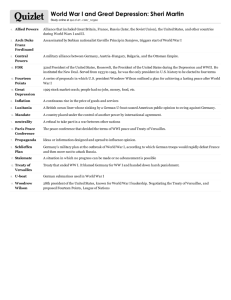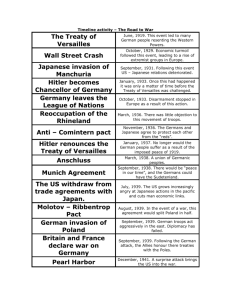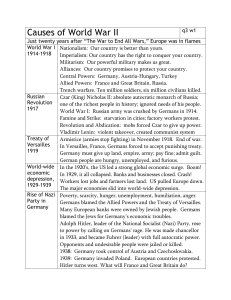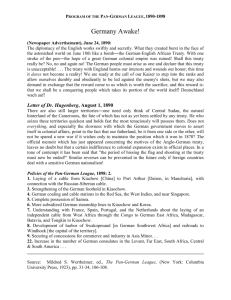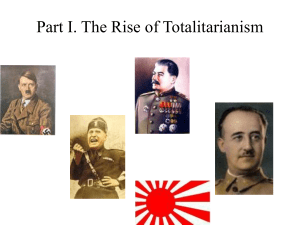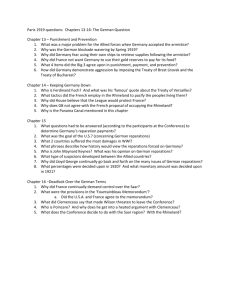Social, Political or Economic Causes of World War II
advertisement
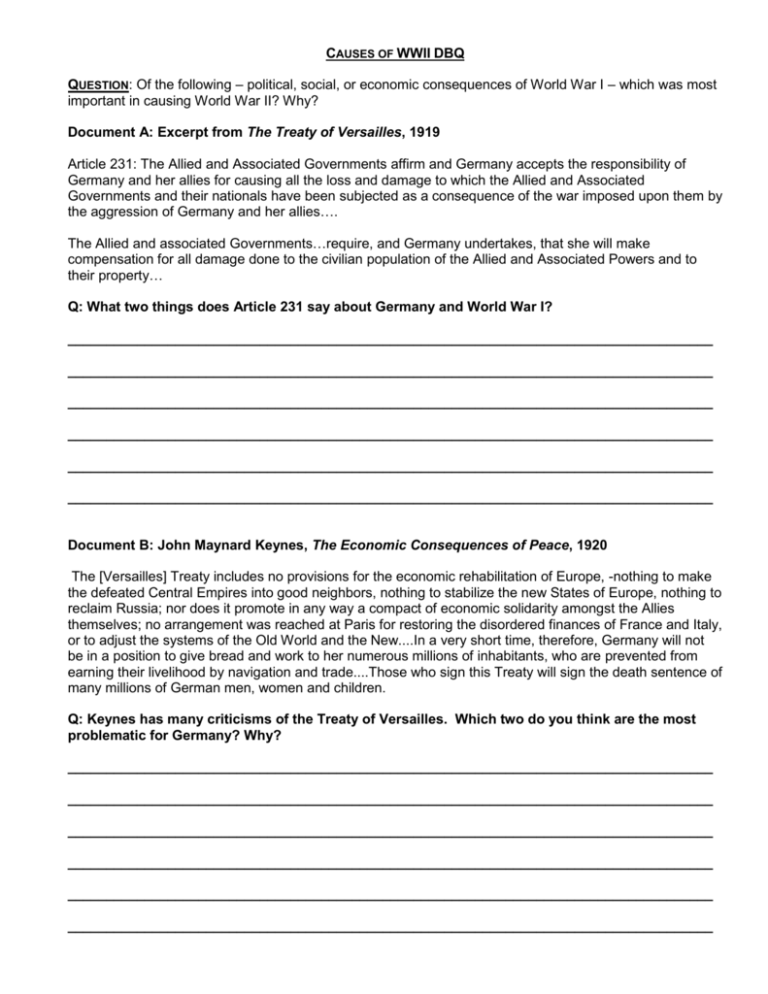
CAUSES OF WWII DBQ QUESTION: Of the following – political, social, or economic consequences of World War I – which was most important in causing World War II? Why? Document A: Excerpt from The Treaty of Versailles, 1919 Article 231: The Allied and Associated Governments affirm and Germany accepts the responsibility of Germany and her allies for causing all the loss and damage to which the Allied and Associated Governments and their nationals have been subjected as a consequence of the war imposed upon them by the aggression of Germany and her allies…. The Allied and associated Governments…require, and Germany undertakes, that she will make compensation for all damage done to the civilian population of the Allied and Associated Powers and to their property… Q: What two things does Article 231 say about Germany and World War I? ____________________________________________________________________________________ ____________________________________________________________________________________ ____________________________________________________________________________________ ____________________________________________________________________________________ ____________________________________________________________________________________ ____________________________________________________________________________________ Document B: John Maynard Keynes, The Economic Consequences of Peace, 1920 The [Versailles] Treaty includes no provisions for the economic rehabilitation of Europe, -nothing to make the defeated Central Empires into good neighbors, nothing to stabilize the new States of Europe, nothing to reclaim Russia; nor does it promote in any way a compact of economic solidarity amongst the Allies themselves; no arrangement was reached at Paris for restoring the disordered finances of France and Italy, or to adjust the systems of the Old World and the New....In a very short time, therefore, Germany will not be in a position to give bread and work to her numerous millions of inhabitants, who are prevented from earning their livelihood by navigation and trade....Those who sign this Treaty will sign the death sentence of many millions of German men, women and children. Q: Keynes has many criticisms of the Treaty of Versailles. Which two do you think are the most problematic for Germany? Why? ____________________________________________________________________________________ ____________________________________________________________________________________ ____________________________________________________________________________________ ____________________________________________________________________________________ ____________________________________________________________________________________ ____________________________________________________________________________________ Document C: Kathe Kollwitz, The Survivors, 1923 Q: What message is Kollwitz making with this art? How does it show disillusionment? ____________________________________________________________________________________ ____________________________________________________________________________________ ____________________________________________________________________________________ ____________________________________________________________________________________ ____________________________________________________________________________________ ____________________________________________________________________________________ Document D: Adolf Hitler, Mein Kampf, 1923 What we see before us of human culture today, the results of art, science, and techniques, is almost exclusively the creative product of the Aryan… The Jew forms the strongest contrast to the Aryan. Hardly in any people of the world is the instinct of self-preservation more strongly developed than in the so-called "chosen people."… But how far the Jew takes over foreign culture, only imitating, or rather destroying, it, may be seen from the fact that he is found most frequently in that art which also appears directed least of all towards invention of its own, the art of acting. But here, too, he is really only the "juggler," or rather the ape; for here, too, he lacks the ultimate touch of real greatness; here, too, he is not the ingenious creator, but the outward imitator, whereby all the turns and tricks he applies cannot deceive us concerning the inner lack of lowers man, and never again can its consequences be removed from the body and mind. Q: How does Hitler portray Jewish people? How does he see them affecting German society and economy? ____________________________________________________________________________________ ____________________________________________________________________________________ ____________________________________________________________________________________ ____________________________________________________________________________________ ____________________________________________________________________________________ ____________________________________________________________________________________ Document E: Treaty of Locarno Between France and Poland, 1925 In the event of Poland or France suffering from a failure to observe the undertakings arrived at this day between them and Germany, with a view to the maintenance of general peace, France and, reciprocally, Poland, acting in application of Article 16 of the Covenant of the League of Nations, undertake to lend each other immediate aid and assistance, if such a failure is accompanied by an unprovoked recourse to arms…. And in the event of Poland or France being attacked without provocation, France, or reciprocally, Poland, acting in application of Article 15, paragraph 7, of the Covenant of the League of Nations, will immediately lend its aid and assistance. Q: What does the Treaty of Locarno say, in simple terms? Why is this important to both France and Poland? ____________________________________________________________________________________ ____________________________________________________________________________________ ____________________________________________________________________________________ ____________________________________________________________________________________ ____________________________________________________________________________________ ____________________________________________________________________________________ Document F: Joseph Goebbels, chief of Nazi propaganda,1930 Why do we oppose the Jews? We are enemies of the Jews because we are fighters for the freedom of the German people. The Jew is the cause and the beneficiary of our misery...He has made two halves of Germany. He is the real cause for our loss of the Great War. The Jew is responsible for our misery and he lives on it. That is the reason why we, as Nationalists and Socialists, oppose the Jew. He has corrupted our race, fouled our morals, undermined our customs, and broken our power. The Jew is the plastic demon of the decline of mankind. We are enemies of the Jews because we belong to the German people. The Jew is our greatest misfortune. Q: How does Goebbels say the Jews are affecting German society? What would make people believe these statements? ____________________________________________________________________________________ ____________________________________________________________________________________ ____________________________________________________________________________________ ____________________________________________________________________________________ ____________________________________________________________________________________ ____________________________________________________________________________________ Document G: Heinrich Hauser, "With Germany’s Unemployed", 1933 An almost unbroken chain of homeless men extends the whole length of the great Hamburg-Berlin highway…. Whole families…had piled all their goods into baby carriages and wheelbarrows that they were pushing along as they plodded forward in dumb despair. It was a whole nation on the march…. Q: How would these conditions make people more extreme in their beliefs? How could a politician take advantage of this situation? ____________________________________________________________________________________ ____________________________________________________________________________________ ____________________________________________________________________________________ ____________________________________________________________________________________ ____________________________________________________________________________________ Document H: Alice Hamilton, Nazism and Youth, 1933 Hitler made each insignificant, poverty-stricken, jobless youth of the slums feel himself one of the great of the earth, since the youth was a German. Hitler told the young men that the fate of Germany was in their hands...He put them into uniforms, he taught them to march and sing together, he aroused that sense of comradeship and esprit de corps so precious to the young, and gave them what is even more precious- an object for hero worship. The most important subject in the new curriculum is history, with the emphasis laid on German heroes, German inventors, German rulers, poets, artists. The German child must be taught that his nation is superior to every other in every field...It is this violent, fanatical, youthful despot, backed by some millions of like- minded youths, who now rules Germany. Truly it is a new thing in the world- a great modern country submitting itself to the will of its young men Q: How did Hitler change how Germans felt about themselves? Is this change because of politics or a change in the way society saw themselves? ____________________________________________________________________________________ ____________________________________________________________________________________ ____________________________________________________________________________________ ____________________________________________________________________________________ ____________________________________________________________________________________ ____________________________________________________________________________________ Document I: French Minister of Foreign Affairs M. P.-E. Flandin, 1936 There had been an effective reoccupation of the demilitarized zone, not by symbolic detachments, but in considerable force. What had taken place was a complete reoccupation. The French Government therefore considered that what had occurred was not merely an attempt at remilitarization, but actual and complete remilitarization…. What had been violated was a treaty into which Germany had freely entered. It was a violation of a territorial character, a violation following upon repeated assurances by the German Chancellor [Hitler] that he would respect the Locarno Treaty and the demilitarized zone on condition that the other parties did the same. Q: What is France upset about? Why do these moves violate the Treaty of Versailles? What does France want to do about it? ____________________________________________________________________________________ ____________________________________________________________________________________ ____________________________________________________________________________________ ____________________________________________________________________________________ ____________________________________________________________________________________ Document J: Neville Chamberlain, British Prime Minister, 1938 I do not wish to enter into any long argument about the historical narrative of events as described by (the German Foreign Minister), but I am bound at once to refute his statement to the effect that His Majesty's Government were not within their rights in interesting themselves in the independence of Austria, and that, as in the opinion of the German Government relations between Austria and Germany are a purely internal affair, His Majesty's Government, as a third party, has no concern in them. Q: How does Chamberlain feel about the German annexation of Austria? Why might he not want to intervene? ____________________________________________________________________________________ ____________________________________________________________________________________ ____________________________________________________________________________________ ____________________________________________________________________________________ ____________________________________________________________________________________ Document K: Munich Agreement, September 29, 1938 1. The evacuation will begin on 1st October. 2. The United Kingdom, France and Italy agree that the evacuation of the territory shall be completed by the 10th of October, without any existing installations having been destroyed, and that the Czechoslovak Government will be held responsible for carrying out the evacuation without damage to the said installations. 3. The conditions governing the evacuation will be laid down in detail by an international commission composed of representatives of Germany, the United Kingdom, France, Italy and Czechoslovakia…. (6) The final determination of the frontiers will be carried out by the international commission. The commission will also be entitled to recommend to the four Powers, Germany, the United Kingdom, France and Italy, in certain exceptional cases, minor modifications in the strictly ethnographical determination of the zones which are to be transferred without plebiscite. Q: How can you connect these parts of the Munich Agreement to the Treaty of Versailles? ____________________________________________________________________________________ ____________________________________________________________________________________ ____________________________________________________________________________________ ____________________________________________________________________________________ ____________________________________________________________________________________
